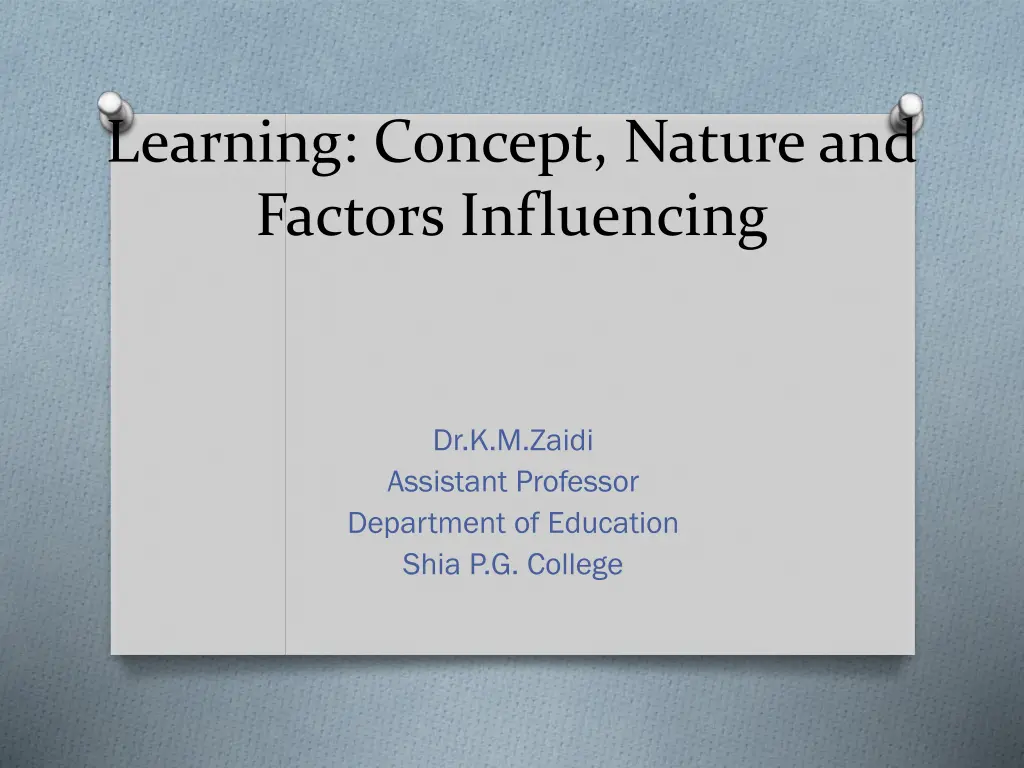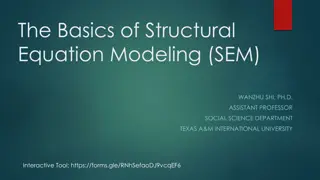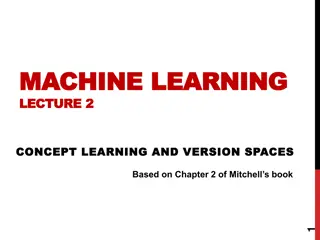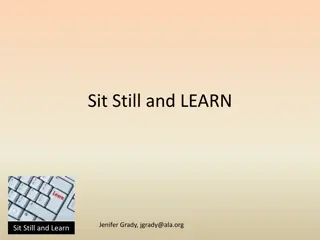
Understanding Learning: Concepts, Nature, and Influencing Factors by Dr. K.M. Zaidi
Delve into the definition of learning according to Skinner, Crow & Crow, Woodworth, Hilgard, Atkinson, and Mathur. Explore the characteristics, types, and related concepts of learning, including cognitive, psychomotor, affective learning, and more. Get insights into the general characteristics of learning and how it influences human development.
Uploaded on | 2 Views
Download Presentation

Please find below an Image/Link to download the presentation.
The content on the website is provided AS IS for your information and personal use only. It may not be sold, licensed, or shared on other websites without obtaining consent from the author. If you encounter any issues during the download, it is possible that the publisher has removed the file from their server.
You are allowed to download the files provided on this website for personal or commercial use, subject to the condition that they are used lawfully. All files are the property of their respective owners.
The content on the website is provided AS IS for your information and personal use only. It may not be sold, licensed, or shared on other websites without obtaining consent from the author.
E N D
Presentation Transcript
Learning: Concept, Nature and Factors Influencing Dr.K.M.Zaidi Assistant Professor Department of Education Shia P.G. College
Definition of Learning O Skinner Skinner- Progressive behavior adoption O Crow &Crow Crow &Crow-Acquisition of habits, knowledge and attitude O R.S. Woodworth R.S. Woodworth-doing something new provided the new activity is reinforced and can reappear in later activities O Hilgard Hilgard & Atkinson & Atkinson-relatively permanent change in behaviour that occurs as a result of practice O S.S. Mathur S.S. Mathur-process of acquiring the appropriate responses
Thus learning is. O a relatively permanent change in response a relatively permanent change in response potentiality which occurs as a function of potentiality which occurs as a function of reinforced practice reinforced practice
Learning and Related concepts O Learning and reflex action Learning and reflex action O Learning and imprinting Learning and imprinting O Learning and maturation Learning and maturation O Learning and performance Learning and performance
General Characteristics of Learning O It is an enduring change in behaviour O It involves cumulative experience O It is dynamic O Influences all aspects of human development-social, emotional and cognitive O It is based on incentives O It is target oriented O Byproduct of maturation and experience
Types of Learning O 1 1- -Cognitive Learning Cognitive Learning O 2 2- -Psychomotor Learning Psychomotor Learning O 3 3- -Affective Affective Learning O 4 4- -Concomitant Learning Concomitant Learning O 5 5- -Discrimination Learning Discrimination Learning O 6 6- -Principle Principle Learning Learning Learning
1-Cognitive Learning O Gaining of information, memorization, ability to perceive relationships between different ideas ,explaining phenomenon in different ways etc. O Cognitive learning enables us to function at high levels of complexity and efficiency
2-Psychomotor Learning O Riding a bicycle ,stitching ,playing badminton etc. which involves muscular co- ordination and physical skills O Learning of skills that have large physical or motor components
3-Affective Learning O Affective learning is largely an outcome of socio-cultural and emotional atmosphere surrounding us O Fear ,love, passion and dislikes illustrate learning involving emotions and feelings
4-Concomitant Learning O Learning unconsciously from environment certain attitudes, values, likes, dislikes for some people or things O Behavior related to moral values, nationalism, truthfulness etc. are largely the outcome of collateral or concomitant learning
5-Discrimination Learning O In learning of discrimination the focus is on one or more similar or related concepts to finely outline the differences O Generalization of concepts is attained through attribute analysis ,selection and comparison
6-Principle Learning O Common features are identified and generalized in discrimination learning common relationships are noted and generalized in principle learning O Principles have applicability and are used in problem solving and have scope for transfer to parallel situation
Factors affecting Learning O 1-Learner related factors O 2-Teacher related factors O 3-Task related factors O 4-Environment related factors
1-Learner Related Factors O Maturation O Motivation O Self-Concept O Goals O Levels of aspiration O Interests O Attention O Study habits
2-Teacher Related Factors O Teacher s personality O Communication O Leadership style O Interpersonal relationship of teacher and learner O Teaching style
3-Task related factors O Methods used O Nature of task O Teaching aids
4-Environment related factors O Physical environment O Socio-emotional environment






















